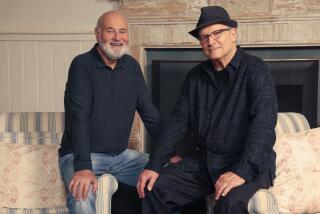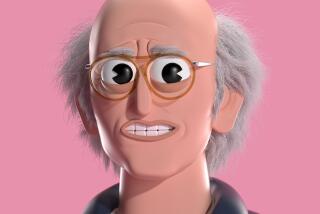A Rare Misstep From a Master of Comedy
- Share via
Anybody who appreciates the presence of genuinely funny and intelligent comedy on television has reason to be grateful to Carl Reiner. This versatile and inventive writer, actor and director has been amusing us for at least half a century. Not only was he the creator of the landmark 1960s comedy series “The Dick Van Dyke Show,” but way back in the early 1950s, he co-starred with the inimitable Sid Caesar and the irrepressible Imogene Coca on the classic “Your Show of Shows.” And then there was--indeed, still is--the wonderful, perennial comedy routine in which he interviews “The 2000-Year-Old Man,” a.k.a. Mel Brooks. Reiner has also made his mark--for better or worse--in the world of cinema, as the director of films like “Oh God!,” “Where’s Poppa?” and “Dead Men Don’t Wear Plaid.” (And without Reiner, there might never have been a Rob Reiner to entertain us as Archie Bunker’s son-in-law on “All in the Family.”)
Reiner has drawn on his fascinating career in two semi-autobiographical books appropriately titled “Enter Laughing” and “Continue Laughing.” It would not have been all that much of a surprise to discover that this multitalented master of comedy was just as talented at writing short fiction. But judged by the 25 short stories contained in his new collection, “How Paul Robeson Saved My Life,” this is one field that, thus far, eludes him.
Most of the stories are brief, some little more than a page or two. Brevity, of course, can be the soul of wit, and from a man who pioneered the art of the comic skit, one might have expected a series of hilarious brief takes. But almost none of these stories have the bite, the flavor or the texture that comes from comedy that is firmly rooted in reality. Apart from a little boy who is briefly tormented by the fear of having injured his playmate in “Hershie and Joey,” the characters have no depth and even less personality. More than skits or vignettes, what most of these stories resemble are jokes, and by jokes, alas, I mean the kind where you see the punch line coming several minutes before the joke-teller gets to it.
Not only are the jokes almost painfully obvious, but there is something distinctly unpleasant about most of them. Yet, it’s not as if Reiner goes in for sick humor. Nor is his wit based on cruelty. Indeed, the stories are, as promised in the subtitle, “mostly happy” ones. That is to say, they tend to have “happy” endings. In “Hampa-Ham,” a little boy, who becomes the special pet of his mega-rich grandfather by cutely mispronouncing the old man’s name, manages to top his own performance when he turns 18 and takes to heart his grandfather’s oft-repeated advice on the importance of going after what you want in a direct manner. He asks the old man for a lot of money and . . . he gets $10 million.
In “Deibenquist Sounds Famous,” a nouveau-riche couple decide to buy a painting they don’t really like because it is expensive enough to indicate that the artist who painted it must be someone whose work will become more valuable. It does. In another story, a mean-spirited snob very predictably named Prissy is annoyed when her brother brings home a sexy, blond beauty queen, “G.G. Giggler,” who not only turns out to be sweet-tempered and intelligent, but also saves her super-rich prospective father-in-law from choking on some food at a dinner party.
Only the faintest echoes of Reiner’s good old social conscience feebly reverberate in the title story and a couple of others just as cliched. There’s lot more limousine than liberal in this collection, and a brand of humor one associates more with dinner party bores than with the man who has been one of the brightest spots on television.
More to Read
Sign up for our Book Club newsletter
Get the latest news, events and more from the Los Angeles Times Book Club, and help us get L.A. reading and talking.
You may occasionally receive promotional content from the Los Angeles Times.









